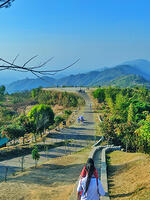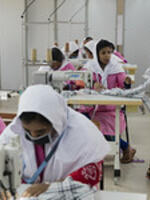Filter by...
Reset all
Publications (74)
Book Chapter
This peer-reviewed research is available free of charge. UNU-WIDER believes that research is a global public good and supports Open Access.
– What Is Missing from National Economic Recovery Plans?
From the book:
COVID-19 and the Informal Economy
Book Chapter
This peer-reviewed research is available free of charge. UNU-WIDER believes that research is a global public good and supports Open Access.
– Unpacking COVID-19 Impact on Livelihoods and Poverty in Rural Areas and Urban Low-Income Settlements of Bangladesh
From the book:
COVID-19 and the Informal Economy
Working Paper
pdf
Throughout 2021, fiscal stimulus packages were introduced to jump-start the COVID-19 ‘post-pandemic’ economic recovery process. While calls for economic recovery packages that promise to ‘build back better’ have come from many directions, the under-allocation of recovery resources directed at...
Book Chapter
This peer-reviewed research is available free of charge. UNU-WIDER believes that research is a global public good and supports Open Access.
From the book:
Tasks, Skills, and Institutions
Book Chapter
This peer-reviewed research is available free of charge. UNU-WIDER believes that research is a global public good and supports Open Access.
The challenges of structural transformation, inequality dynamics, and inclusive growth in Bangladesh
From the book:
The Developer’s Dilemma

Almost everywhere, women are underrepresented in labour markets compared to men. While labour force participation among women of working age (FLFP) has increased in recent decades, the vast majority of women in South Asia remain out of the labour market. Traditional roles and gender norms still...
Working Paper
pdf
The social and economic impact of COVID-19 has been deep, wide-ranging, and multi-dimensional. While anecdotal evidence of distress among the poor, particularly those with informal occupations, has been widespread, effective policy response has required real-time, researched data disaggregated for...
Journal Article
This peer-reviewed research is available free of charge. UNU-WIDER believes that research is a global public good and supports Open Access.
– Insights from the Hrishipara diaries
We examine the impact of the COVID-19 pandemic on the livelihoods of the poor in a semi-rural setting in Bangladesh. We use an unusually rich dataset which tracks the economic and financial transactions of sixty poor and very poor individuals and their families on a daily real-time basis for 12...

The opening keynote of the recent WIDER Development Conference, COVID-19 and development – effects and new realities for the Global South, was given by Oriana Bandiera, Sir Anthony Atkinson Professor of Economics at the London School of Economics, an accomplished economist with several awards under...

The Hrishipara Daily Diaries Project has been tracking the daily spending of 60 poor households in rural Bangladesh for the last six years. Analysis of the data collected – especially the changes to spending patterns that have occurred during the pandemic – reveals four areas where policymakers...
Working Paper
pdf
– A mixed-methods analysis of gender and labour market segmentation in Bangladesh
Data on female labour force participation in Bangladesh suggest that, despite the increase in female-intensive employment opportunities through microfinance, export garment manufacturing, and community-based services, the majority of working women are concentrated in home-based activities. There...
Working Paper
pdf
– Insights from the Hrishipara diaries
In this paper, we examine the economic impact of the COVID-19 pandemic on the livelihoods of the poor. We use an unusually rich data set from a ‘financial diaries’ study known as the Hrishipara Daily Diaries Project. The data set tracks the economic and financial transactions of 60 individuals and...
Working Paper
pdf
Although microfinance started as a movement to improve women’s economic well-being through increased female entrepreneurship in particular, its impact on women’s attitudes toward and participation in the labour market is not fully understood. We fill this gap by combining data on branch locations of...
Working Paper
pdf
– Evidence from Labour Force Survey data of Bangladesh
With structural changes in production coupled with technological progress, there have been shifts in modes of production and patterns of employment, with important consequences on task composition of occupations. This paper has utilized different rounds of Labour Force Survey data of Bangladesh and...
Working Paper
pdf
Using detailed microdata, we document how migration-dependent households are especially vulnerable during the COVID-19 pandemic. We create pre- and post-COVID panel datasets for three populations in Bangladesh and Nepal, leveraging experimental and observational variation in prior migration...
Displaying 16 of 74 results
 Join the network
Join the network